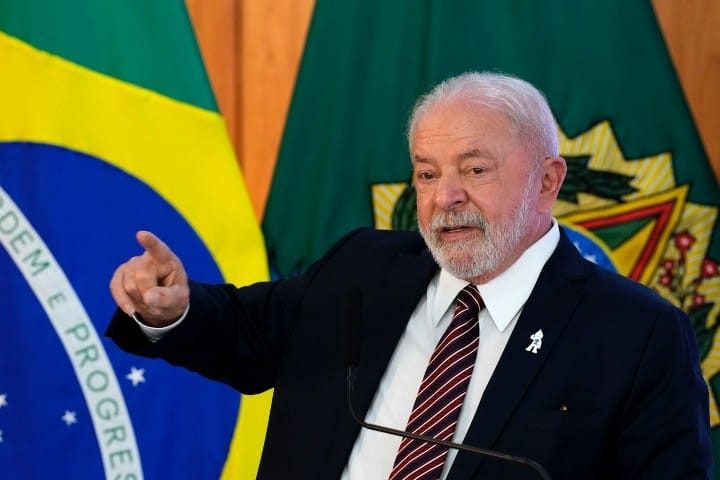
SINGAPORE — After arriving in Beijing on April 14 for talks with Chinese leader Xi Jinping, socialist Brazilian President Luiz Inácio Lula da Silva warned the United States against further provoking the Russo-Ukraine conflict, declaring that his country would expand and increase collaboration with China.
In an interview with reporters, Lula asserted that “the United States needs to stop encouraging war and start talking about peace.”
“The European Union needs to start talking about peace so that we can convince [Russian President Vladimir] Putin and [Ukrainian counterpart Volodymyr] Zelensky that peace is in the interest of everyone and that war is only interesting, for now, to the two of them,” he highlighted.
Both Lula and Xi agreed that dialogue and negotiations would bring about an end to the Ukraine conflict. The Brazilian leader disclosed that during talks with Xi, the two had discussed setting up a group of like-minded leaders to grapple with the Ukraine conflict.
“I have a theory that I have already defended with [French President Emmanuel] Macron, with [Chancellor] Olaf Scholz of Germany, and with [U.S. President Joe] Biden, and yesterday, we discussed at length with Xi Jinping. It is necessary to constitute a group of countries willing to find a way to make peace,” Lula posited, following White House press secretary Karine Jean-Pierre’s remarks that Washington would continue aiding Ukraine militarily.
Since the onset of the Russo-Ukraine conflict in February last year, the United States and its allies have been providing military help to Kyiv. Moscow has repeatedly cautioned that Western aid would extend the brutal conflict, as it views such military arms as legitimate targets. Russian Foreign Minister Sergey Lavrov emphasized that NATO’s training and arming of Ukrainian forces is equivalent to direct participation in the conflict.
Moreover, in a Twitter post, Lula said that he had signed deals with China to “advance in areas such as renewable energy, the automotive industry, agribusiness, green lines of credit, information technology, health and infrastructure.”
Xi said that both sides “share extensive common interests” and that China will increase and reinforce its cooperation with Brazil, assuring Lula that Beijing has made relations with Brazil a diplomatic priority. Chinese state media Xinhua reported that Xi indicated that he sees opportunities for increased bilateral ties in many fields, with agriculture, energy, and infrastructure construction being the most likely beneficiaries.
According to Xi, China’s speedy development would “unlock new opportunities for Brazil” — geographically and demographically the largest country in South America — as well as “countries around the world.” By such bilateral collaboration, both Brazil and China could ride on China’s technological progress, Xi said.
The last time Lula (77) and Xi (69) met was in early 2009, when the Brazilian president was midway through his second term as president and at the peak of his power.
On April 12, Lula arrived in Shanghai, marking his first visit outside the Americas since controversially assuming the presidency last year in a closely fought election campaign against conservative candidate and former Brazilian president Jair Bolsonaro.
“We have an extraordinary relationship with China, a relationship that every day gets more acute and stronger,” Lula had announced before meeting Xi, elaborating that bilateral ties should not rest only on commercial grounds.
The two nations, partly via the BRICS bloc of emerging economies (comprised of Brazil, Russia, India, China, and South Africa), hope to materialize their “multipolar” world vision in which the United States would be just one among several superpowers.
Hence, during his speech at the New Development Bank in Shanghai, also dubbed the “BRICS bank,” Lula urged in favor of replacing the U.S. dollar with other currencies for use in international trade.
BRICS alliance members should create their own alternative currency for use in trade, he claimed, commenting that he has asked himself “every night” the question of “why all countries have to base their trade on the dollar.”
A joint statement by Lula and Xi on Friday, published on the website of the Brazilian Foreign Ministry, declared that “they [Brazil and China] supported the promotion of active discussions amongst BRICS members on the BRICS expansion process and stressed the need to clarify the guiding principles, norms, criteria and procedures for this expansion process based on broad consultation and consensus.”
The same statement added that Beijing and Brasilia also agreed to step up cooperation to tackle what they saw as the issues of “climate change” and biodiversity loss.
“Bearing in mind that the effects of climate change are already being unequivocally felt, Brazil and China have decided to strengthen their cooperation in the area of environmental protection, combating climate change and the loss of biodiversity, promoting sustainable development and ways to speed up the transition to a low-carbon economy,” the statement read. To that end, both sides decided to set up a Subcommittee on the Environment and Climate Change within the Sino-Brazilian High Level Commission for Consultation and Cooperation.
During his stay in Beijing, Lula emphasized that his country would not be stopped from developing ties with China: “Yesterday we visited Huawei. It is a demonstration that we want to tell the world that we have no prejudices in relations with our Chinese counterparts. No one will prohibit Brazil from improving relations with China.”
Lula’s China trip came two months after his meeting with U.S. President Joe Biden in Washington. In an interview with Russian-based Sputnik News, Dr. Ken Hammond, writer and professor of East Asian and global history at New Mexico State University, opined that Lula’s China visit can be interpreted as an indication that more people have become resentful over American global dominance.
“What we’re seeing is that people in countries around the world don’t want to be in a unipolar world dominated by the United States. And they are increasingly seeing China as a viable alternative, not the only alternative, but, you know, as a country that it’s good to work with,” Hammond claimed. He added that “the Chinese are trying to build a new multicentric international order,” and that Beijing is trying “to support the development of countries like Brazil through things like the Belt and Road Initiative. It’s just a logical process.”
Hammond also singled out Sino-U.S. ties, with which he claimed Communist China is “very frustrated,” and maintained that Washington “persists in adopting an attitude of hostility” toward China, trying to incite the country to act belligerently and “cut off educational contacts and informational exchange with ordinary people.”
Alluding to events in early February this year, when U.S. Secretary of State Antony Blinken postponed his visit to China over the Chinese balloon in American airspace, Hammond felt that it was “entirely legitimate” for China “to keep people like Blinken a little bit at arm’s length.”
“When he [Blinken] has gotten together with Chinese leaders and officials in the past, all he’s done is basically berate them, tell them to get with the American program and kind of try to throw his weight around. So who wants that? Why do you want this guy in the room when you have this ongoing process of building more creative or mutually beneficial relationships with countries where the vast majority of people in the world live?” the professor asked.
It is undeniable that America’s post-World War II dominance has been premised on its global clout in areas such as Europe, with NATO functioning as the primary conduit for Deep State neocons to act according to their globalist and supranational whims.
For years, the leftist establishment and power-hungry elites in the Washington swamp have been persecuting God-fearing and freedom-loving Americans. For example, President Biden labeled patriotic MAGA Americans as threats to the country, and the FBI is surveilling and cracking down on conservative Latin-Mass Catholics. In an April 11 letter, Representative Jim Jordan (R-Ohio) indicated that the FBI’s plan was to reach out to “mainline Catholic parishes” and the local “diocesan leadership,” as well as leadership within the Society of St. Pius X (SSPX) group in Richmond to “develop news sources” to snitch on what the FBI has alleged to be “suspicious activity.”
Of course, Communist China has been far from altruistic in its motives and actions as well, closely keeping tabs on civilians with high-end technology, economically enslaving developing countries in its Belt and Road Initiative (BRI), persecuting religious Chinese such as Roman Catholic Cardinal Joseph Zen, and egregiously violating international deals such as the 2018 Sino-Vatican agreement by unilaterally nominating bishops without Vatican involvement.
In March, China’s new Premier Li Qiang told the National People’s Congress that the Chinese Communist Party (CCP) must “actively guide religions to adapt to socialist society.”
Churches in Xi’s authoritarian China that resist state regulations have to gather clandestinely for worship, with those operating the “underground churches” remaining constantly at risk for fines, jail time, and even death.



